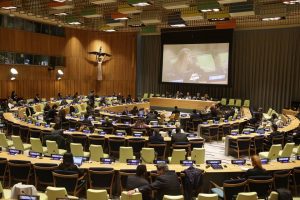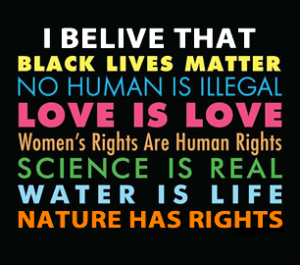Rights of Nature and the UN
 The UN met recently to discuss the ongoing “Dialogue on Harmony with Nature” and the Rights of Nature here in New York. Professor Klaus Bosselmann was there to promote and discuss work supporting the idea of an Earth Charter. Bosselmann is Director of the New Zealand Centre for Environmental Law at the University of Auckland and an Earth Jurisprudence expert.
The UN met recently to discuss the ongoing “Dialogue on Harmony with Nature” and the Rights of Nature here in New York. Professor Klaus Bosselmann was there to promote and discuss work supporting the idea of an Earth Charter. Bosselmann is Director of the New Zealand Centre for Environmental Law at the University of Auckland and an Earth Jurisprudence expert.
His presentation was titled “The Next Step: Earth trusteeship”. In it he argues that the world leaders, especially through the new Sustainable Development Goals (SDGs), should focus on making nations the stewards of nature.
An Earth-centred worldview recognizes the intrinsic value of Nature; understands humans as fundamentally part of the natural world, that is, one life-form among many evolved from the same natural processes. It further recognizes that there are biophysical limits to human activity and that our socioeconomic systems are embedded in natural systems. In this worldview, human-Earth relationships are based on a symbiotic connection, are interconnected and are subject to the natural laws of the Universe.
Indigenous peoples’ philosophies, spiritualities and traditional forms of knowledge worldwide express the understanding that human governance systems must be derived from the laws of the Earth and comply with them.
Rights of Nature
The idea that nature can have rights has gained stream over the past 50 years at the international level. Significant efforts have been put in developing a set of laws to support this idea, referred to variously as Earth jurisprudence, wild law or the rights of nature. I’ve written about some examples of this before, such as a series of videos produced around the theme: Nature doesn’t need people. People need nature. Examples of these rights include the constitutions of Ecuador and Bolivia, both of which grant some legal rights to the Earth. New Zealand, Australia and India als certain rights have been given to rivers or waterways.
This most recent UN meeting is part of an ongoing series of workshops, meetings and statements about the importance of protecting the Earth, and ways that this might be achieved at the global level. To date the UN has held 6 “Interactive Dialogues on Harmony with Nature.” This meeting was the 7th. You can read the various statements and documents from these earlier events on the UN website here.
You can also read more coverage of the April 2017 event via the Earth Charter website, including more of Professor Bosselmann’s remarks.


